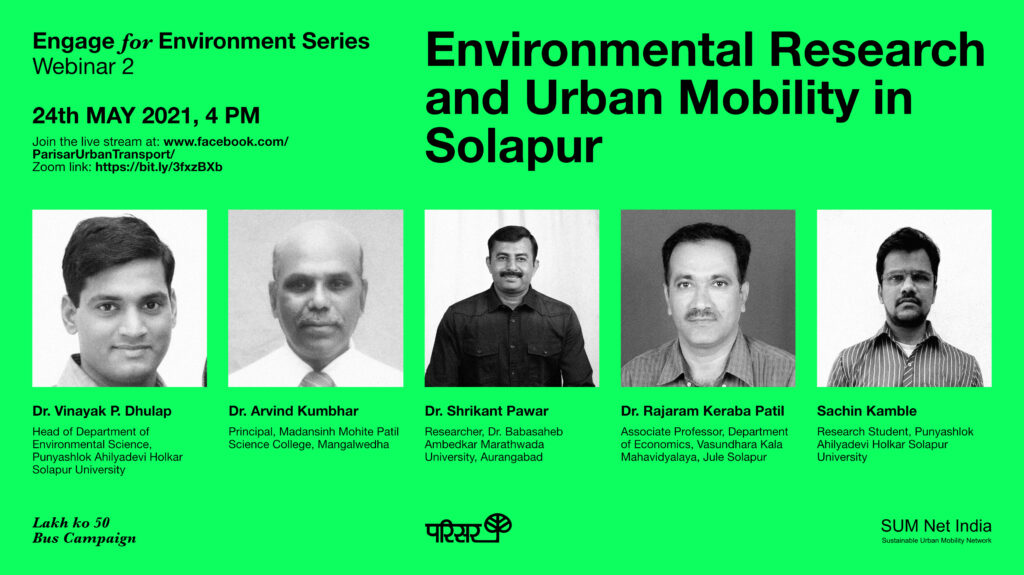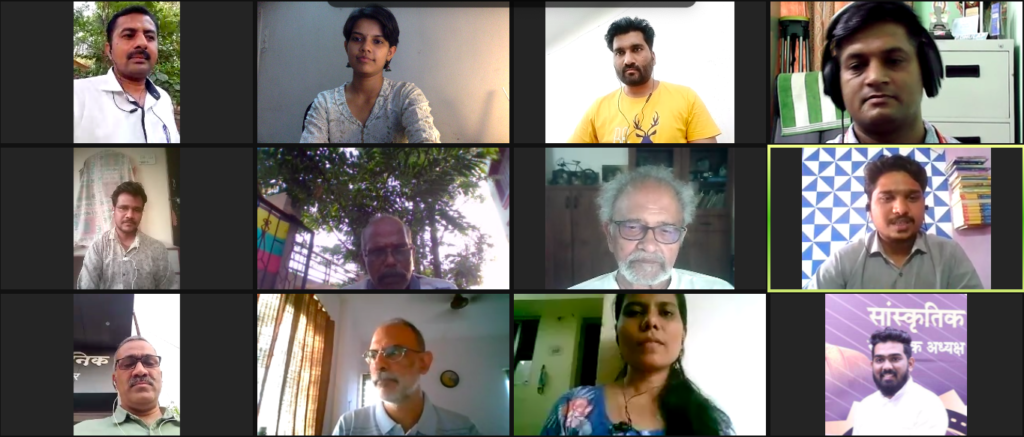A web roundtable was organised as part of Parisar’s multi-city webinar series titled ‘Engage for Environment: Environmental Research and Urban Mobility’ in Solapur. Second in the series, this webinar continued the engagement with research scholars, academicians and environmentalists to explore how they understand the linkages between environment and urban mobility, and how this knowledge informs decision- and policy-making in Solapur. This webinar series is part of a statewide campaign, ‘Lakh ko 50’ which demands a comprehensive program or policy by the Maharashtra State Government to ensure that the citizens in all the cities of the state are assured a good bus-based public transport system. The campaign highlights the need for at least 50 buses per lakh urban residents, a benchmark set by the Ministry of Housing and Urban Affairs (MoHUA).

Dr. Vinayak P. Dhulap, Head of Department of Environmental Science at Punyashlok Ahilyadevi Holkar Solapur University talked about the growing number of private vehicles in Solapur, in the absence of an efficient public transport, and the environmental challenges it poses. “For a city of 10 lakh population, there’s close to 8.5 lakh private vehicles which threaten the ecosystem of the city”, maintained Dr. Dhulap. He also talked about the increasing concretisation, and cementing of roads in the city which is creating heat islands.
Dr. Dhulap comprehensively listed the link of urban mobility with a wide range of ecological issues like wildlife, biodiversity, green spaces, land and soil degradation, water and noise pollution. Subsequently, he delineated a set of recommendations for reducing air pollution which included steps like banning of 15 year old commercial vehicles, public awareness, introducing e-mobility and intelligent transport system (ITS) solutions, etc.
Dr. Shrikant Pawar, researcher at Dr. Babasaheb Ambedkar Marathwada University, Aurangabad opined that just as public transport needs to be increased, the number of private vehicles in the city need to be reduced. He significantly highlighted that efforts to strengthen public transport must go hand-in-hand with disincentivizing private vehicles. Contextualising this balanced approach, Dr. Arvind Kumbhar, the Principal of Madansinh Mohite Patil Science College, Mangalwedha talked about the changing urban lifestyles and aspirations which needs to be responded with provision of long-term and effective services and infrastructure with least damage to the environment.
Dr. Rajaram Keraba Patil, Associate Professor of Economics at Vasundhara Kala Mahavidyalaya supported the ‘Lakh ko 50’ campaign and underlined its crucial importance in a city like Solapur where for a population of 10 lakh there are only 20 to 30 buses. Resultantly, the number of private vehicles, especially two-wheelers is increasing at a tremendous rate and three-wheelers are functioning as proxy public transport. Of the 200 buses that Solapur received under the JnNURM (Jawaharlal Nehru Urban Renewal Mission), about 180 are out of operation, while the operational ones are in deplorable condition. “There are three pillars to a good public transport system- population, routes, and availability of buses. Sadly, Solapur’s municipal bus service does not take into account any of these”, added Dr. Patil.

Adding to these three pillars, research student, Sachin Kamble from Punyashlok Ahilyadevi Holkar Solapur University highlighted the need for a reliable, accessible and comfortable public transport which can ensure more takers for public transport in the city. He also listed the several health and environmental impacts of increasing motorisation and non-fuel efficient transport. He presented the data for the increasing number of patients for respiratory and other pollution-related ailments in Solapur hospitals which is worsening day-by-day. “Increasing the buses in the city must be seen as an important step to counter this”, expressed Mr. Kamble.
The panelists also talked about existing channels of collaboration with the local government where the knowledge, data and skills of academia is leveraged for policy-making and implementation. Dr. Dhulap mentioned the Environmental Science department’s role in ambient air quality monitoring and recording of data. He also talked about campus-specific awareness initiatives like observing no-pollution days, inclusion of geoinformatics and environmental informatics in the university syllabi, etc. Dr. Patil enumerated projects like documenting carbon emissions at traffic signals in the city which can lead to important decisions.
Dr. Patil emphasized the changes that an efficient administrator can bring about, something that Solapur witnessed between the years 2007 to 2009. He added that the nature of collaboration between educational institutions and decision-making bodies also rests on the vision of the decision-makers. Mr. Kamble noted that a recent vision document for Solapur 2041 prepared jointly by the Central Government and World Bank did not have a single local expert in its drafting committee. He expressed that representation of local stakeholders and a down-up approach to policy and decision-making must be encouraged.
Mr. Ranjit Gadgil, Program Director of Parisar summarized the problem statements and solutions laid out by all the speakers and talked about the role that academic institutions can play in assisting the city corporation to prepare the Environment Status Report (ESR), an important tool for the governing body as well as the citizens’ which is both a source of information and education. As per the MMC‘s (Maharashtra Municipal Corporations) Act 1949, section 67 (A), it is mandatory for all the ULBs of the state of Maharashtra, to submit an annual ESR to the General Body.
Appreciating the importance of discussions like these, Sujit Patwardhan, the founder member and trustee of Parisar, thanked all the speakers for their valuable inputs and expressed that the ‘Lakh ko 50’ campaign will keep coming back to these city-specific learnings to further the demand for efficient bus services in all the 27 Municipal Corporations of Maharashtra.
The webinar was live streamed on Facebook. The discussion was moderated by Parisar’s Campaign Coordinator Vikas Tatad and City Coordinator Sanghapal Shinde.